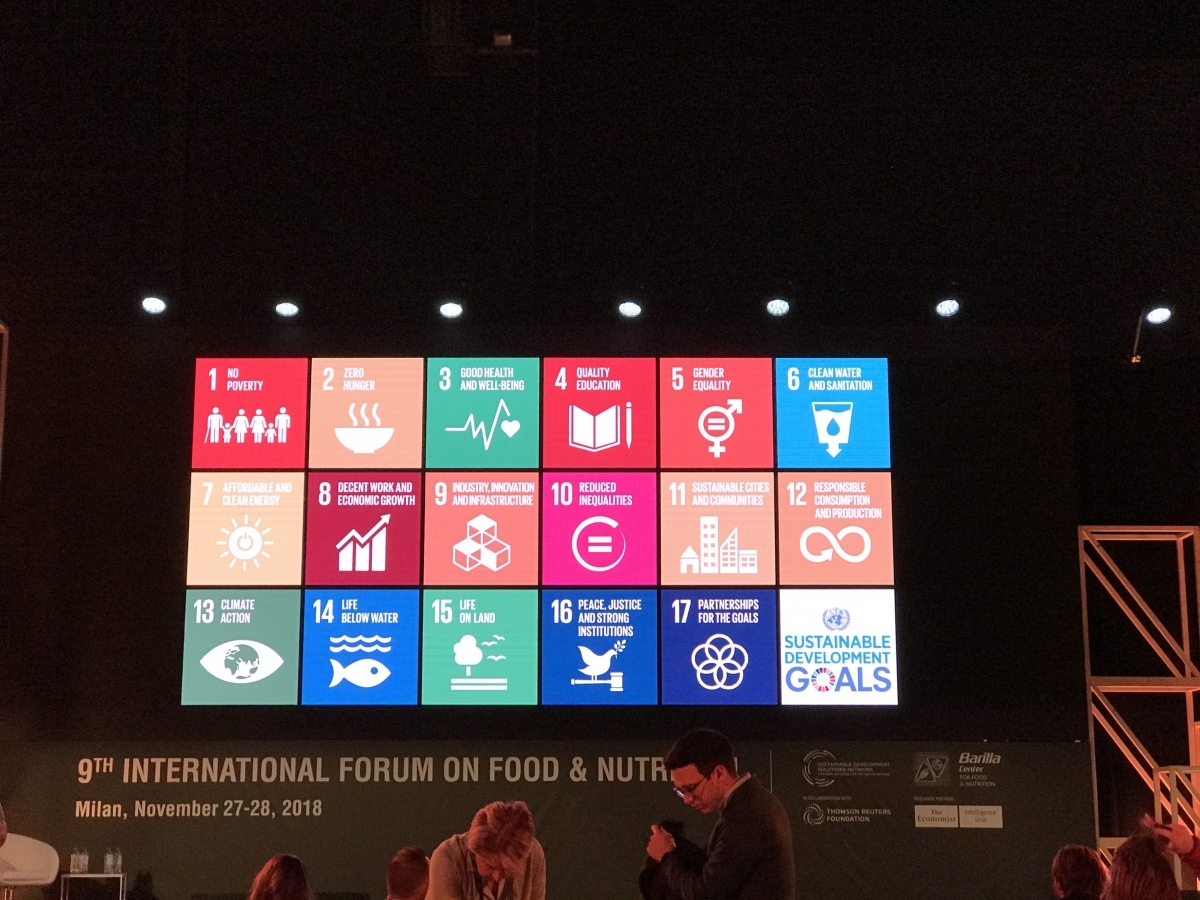-
About
- Our Work
- Get Involved
- Stay Updated
On November 27th and 28th 2018, the International Forum on Food and Nutrition (9th edition) organized by Barilla Center for Food and Nutrition (BCFN) was once again back in Milan, Italy! This important event brings sustainability expert speakers from all over the world, providing also a stage for the young, media and the good practices to generate the real change required for achieving the Sustainable Development Goals set by the United Nations 2030 Agenda.
On Wednesday 28th, the first session illustrated the current status of food sustainability and concrete case studies for an insight into how to change food systems in order to achieve the SDGs.
The second session offered an in-depth look into the key role played by cities in the shift towards sustainable food systems while the third one looked at co-operation and development to combat climate change and food insecurity. The last morning session looked at the action plan developed by the UN Sustainable Development Solutions Network and the BCFN Foundation to achieve the Sustainable Development Goals. The President of the Barilla Group and the BCFN Foundation, Guido Barilla, illustrated the work undertaken by BCFN and SDSN to develop a roadmap for the SDGs of the 2030 Agenda, which will be presented to the Heads of State and Governments at the SDG Summit 2019 and at the UN Climate Summit Summit 2019. During this session, we also out the winners of the BCFN YES! 2018.
The current status of food sustainability
All participants agreed that a transformative approach is much needed to achieve food sustainability: This year, the event was about action and empowering, knowing exactly which problems our food system is facing. The main goal set up by BCFN is to achieve sustainable development ending poverty while enhancing environmental and economic sustainability.
It is hard to reach durable solutions about food system because, for example, food producers footprint is equal to 224% of their revenue. The Food Sustainability Index (FSI) serves to identify countries best practices but also countries gaps and it is based on 3 pillars: Food loss and waste, sustainable agriculture and nutritional challenges while containing 37 indicators and 89 individual metrics addressing societal, environmental and economic themes. Indicators are built taking into account SDGs (more info on FSI).
One of the major problems that developed countries are dealing with is food waste. If wasted food were a country it would be the worlds 3rd largest greenhouse country. We have to move from policy pull to investment push. Business in the food industry must be both sustainable and inclusive in daily operations.
For example, the Municipality of Milan developed a large range of actions to address food waste. These include: 1) a discount on the waste tax in favor of food businesses that donate their food losses to charities; 2) affiliation of school canteens to food banks to distribute surplus; 3) distribution of doggy bags in schools to encourage children to take any food surplus back home; 4) facilitation of the Local Food Waste Hub, a system of redistribution of food losses (for more information about other Urban Food Actions Platforms, please visit this FAO page).
Cooperation and development against climate change and food insecurity

International trade has helped to reduce food insecurity increasing food availability worldwide: indeed, 1 billion people are almost entirely dependent on international trade to be fed. In a world thats globally integrated and where countries depend on each other, its very dangerous that one country can decide to restrict the trade or decide to stop doing it. For that, it is necessary to improve the rules of international trading.
Nowadays, more money than ever has been invested in climate change but We need more biodiversity in the field and on the table. Globally, there are 30,000 edible plants, but we eat only 150. Of these, just 12 types deliver 80% of the worlds food today, and just 3 species make up 75% of our calories. said Martha Fleckenstein from WWF.
BCFN YES Competition Winners
The 2018 BCFN YES! engaged young Ph.D. students and post-doc researchers, inviting them to present a research project to improve the sustainability of our food system. On 28th November, three winners were announced, each rewarded with a 20,000 cheque to fund their research for a year. The winner projects were:
- Enhancement of Sustainable Agriculture through the adoption of Bio-Integrated Crop Management among smallholder Tomato Farmers in Tanzania: Conventional versus Non-Conventional Farming Methods.
- The Silent Revolution: How smallholder farmers collective knowledge is shaping soil productivity in Ethiopia.
- YES! to participatory agroecology: Farmer-led plant breeding and soil regeneration in Maya milpas of southern Belize.
What about the participation of a YPARD member next year?
Picture credit: Virginia Cravero (YPARD Italy)
About the author
Related Posts
Comments
No comments made yet. Be the first to submit a commentBy accepting you will be accessing a service provided by a third-party external to https://archive.ypard.net/
Get in touch
Email: [email protected]
YPARD Global Coordination UnitHosted by AGRIDEA and the Czech University of Life Sciences Prague
Lausanne, Switzerland and Prague, Czech Republic - Our Work

